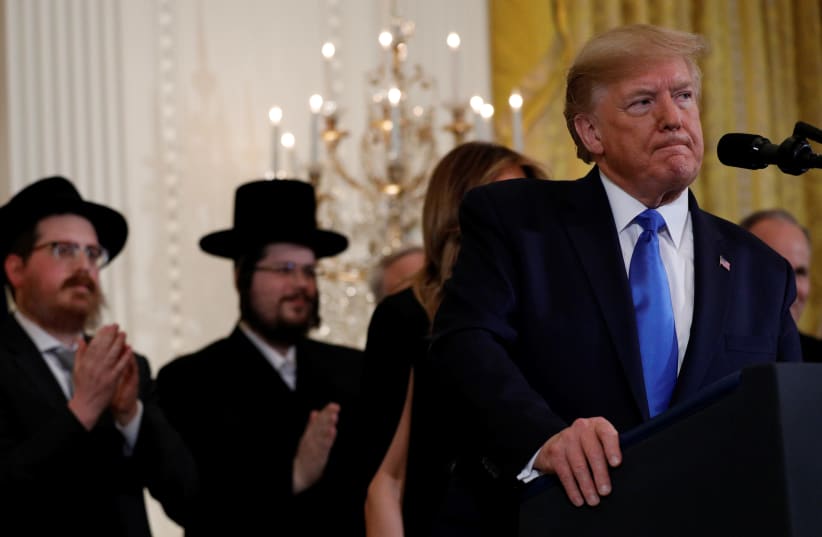A few days before the election, my good friend called me in tears.
“I just found out my parents are voting for Trump,” she said, distressed.
I understood her dismay. As women who were raised in Modern Orthodox communities in New York in the 1980s, we both believed in Jewish values like pursuing justice (tzedek, tzedek tirdof) and repairing the world (tikkun olam). Decades ago, our families and communities were firmly allied with the Democratic Party and its values.
But neither one of us remained observant, and the community that we left is not the same as it was.
That’s why I was not surprised that her family had voted for Trump.
Even though I don’t talk politics with my ultra-Orthodox family, because I want to keep talking to them), I know they supported Trump both in 2016 and 2020 (unlike my friend’s Modern Orthodox parents, who’d voted for Hillary back in 2016). Most ultra- and Modern Orthodox Jews on the East Coast, and quite a few Conservative Jews, swung Right, too.
In the aftermath of the election – if we ever get to an aftermath – there will be much analysis of demographics: the age, gender, race, education level, socioeconomic status, and religion of who voted for which candidate and why (and especially why the polls were so fantastically off).
Already the media has gotten it wrong when it comes to one group, Latinos. Or Hispanics. Whatever nomenclature one uses, the tallies were off. In Florida they handily voted for Trump, but the swing states of Arizona, New Mexico and Philadelphia turned out to be crucial in ousting the incumbent.
“Here’s why the Latino vote is so divided,” Steven Odali Rodriguez wrote on the online open digital platform Medium, breaking down the Latino vote by country of origin, age, generation since immigration, gender and religion. “The truth is we do not all hold the same interests,” he said.
A writer for The New York Times opined, “Democrats may need to rethink their strategy as the class complexities and competing desires of Latino and Asian-American demographic groups become clear.”
I am certainly no expert on demographics, but I do know one thing: Like Asian-Americans and Latinos, we Jews are clearly not under one umbrella. In fact, the stark schism in the Jewish vote has been growing for years. According to the Pew Research Center, the Jewish vote has been going from an 80-20 Democrat/Republican split since 2000 toward more of a 70-30 split. In 2000, 79% of Jews voted Democrat vs. 19% Republican; in 2004, it was 74-25, and in 2012, 69-30.
AP VOTECAST had the split this year at 68% for Biden and 31% for Trump, which they termed “overwhelmingly” for Biden.
But anyone watching the numbers of the Jewish vote over the years (i.e., only other Jews) knows that there was not overwhelming support for the Democratic candidate, but an increase in support for either the Republican Party or its current head, Donald Trump.
We Jews are growing further and further apart: it seems the more observant are allying with the conservative movement in the US and the less observant are affiliated with the liberal movement. Take the recent ridiculous Supreme Court case on limiting religious services during the pandemic, brought by the Roman Catholic Diocese of Brooklyn and Agudath Israel of America, once unlikely allies (hello, Holocaust?), now cozy bedfellows
And yet we Jews are still lumped together as “The Jewish Vote.”
We are far from monolithic. We are divided. And that division is growing.
We must finally face it: There is no more a Jewish vote than a Latino or Asian-American one, or than there is a “United States” of America. This nation is split down the middle, literally, with a red swath and a (growing) blue border.
We Jews only account for 3% of the vote. So why does it matter? We’re not swinging any states. (Hispanics, on the other hand, comprise almost 20% of the population).
I suppose it matters for many reasons: While the rest of the country may be able segregate into red and blue states, into rural and urban areas, into Mexican-Americans and Cuban-Americans, into isolated social media bubbles that cannot believe who voted for whom (if you kicked out all the people who voted unlike you, you don’t get to be shocked at the voter turnout), I’m not sure we Jews segregate so neatly.
Fear not: I’m not going to be all kumbaya, calling out for reaching across the aisle. (Biden’s done that already and been mocked for it by both hurt sides.)
People like me don’t need to “reach out” anywhere, except to look across the table, or Zoom screen. The division is here.
The question is: What do we do with it?
There may not be a “Jewish vote,” but I’d like to believe that there’s still a Jewish people.
The writer is the author of The Trying Game: Get Through Fertility Treatment and Get Pregnant without Losing Your Mind.
